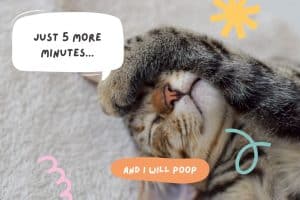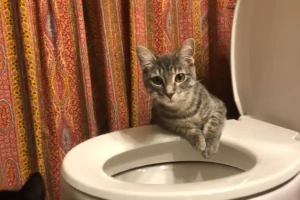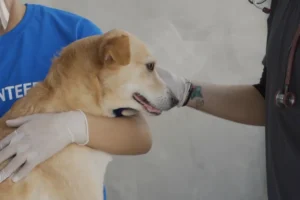Intro: Have you ever wondered why your cat seems to struggle with controlling her poop? It can be frustrating and perplexing, but there are reasons behind this common issue.
Understanding the Physiology of Cats’ Digestive System
Cats have a unique digestive system that is designed to efficiently process their high-protein diet. Their digestive tracts are relatively short compared to other animals, allowing for quick digestion and absorption of nutrients. This fast-paced digestion can sometimes lead to issues with bowel control, as the feces may not be as firm or easy to hold in. Additionally, cats have a sensitive digestive system that can be easily disrupted by changes in diet, stress, or underlying health conditions.
One key aspect to consider is hydration. Cats need to consume enough water to maintain proper digestion and prevent constipation, which can contribute to problems with bowel control. Feeding a balanced diet with high-quality protein and fiber can also help regulate your cat’s digestion and prevent issues with bowel movements.
Understanding your cat’s natural physiology and providing proper nutrition and hydration can go a long way in helping her maintain control over her bowel movements.
Common Medical Reasons for Lack of Control
There are several potential medical reasons why your cat may be struggling to control her poop. One common issue is gastrointestinal parasites, such as worms, which can disrupt your cat’s digestive system and cause issues with bowel movements. Regular deworming treatments can help prevent and address this problem.
Inflammatory bowel disease is another common condition that can affect a cat’s ability to control her bowel movements. This chronic inflammation of the digestive tract can lead to diarrhea, constipation, and other issues that impact your cat’s bowel control.
Other health issues such as diabetes, hyperthyroidism, or urinary tract infections can also play a role in your cat’s bowel control problems. It’s essential to consult with your veterinarian to properly diagnose and treat any underlying medical conditions that may be affecting your cat’s digestive health. Regular check-ups and preventive care can help maintain your cat’s overall health and well-being.
Behavioral Factors That Influence Bowel Movements
Has your furry friend been having trouble controlling her poop? Well, it might be more than just a random occurrence. Your cat’s behavior and environment play a significant role in her bowel movements. Stress, anxiety, or changes in routine can all affect her poop control. To help your cat, create a calm and consistent environment. Provide hiding spots and scratching posts to reduce stress. Consider using pheromone diffusers to promote relaxation. Additionally, ensure your cat has easy access to her litter box and keep it clean at all times. By addressing these behavioral factors, you can support your cat in gaining better control over her bowel movements.
Diet and Hydration’s Impact on Bowel Control
The food your cat eats and her hydration levels can directly impact her bowel movements. A diet lacking in fiber or rich in low-quality ingredients can lead to irregularity in her poop schedule. Ensure your cat’s diet is high in fiber to promote healthy digestion. Additionally, make sure she drinks enough water to prevent constipation. Consider adding wet food to her diet to increase moisture intake. By making these dietary changes, you can improve your cat’s bowel control and overall health.
- Monitor Water Intake: Keep an eye on how much water your cat is drinking daily. Dehydration can lead to constipation, affecting her poop control. Consider using a fountain to encourage more water consumption.
- Fiber-Rich Foods: Incorporate fiber-rich foods like pumpkin or psyllium husk into your cat’s diet. These can help regulate her bowel movements and improve poop control.
- Limit Dairy Products: Some cats are lactose intolerant, and dairy products can lead to digestive issues. Avoid giving your cat milk or cheese to maintain her bowel health.
By paying attention to your cat’s behavior, environment, diet, and hydration, you can play a vital role in improving her poop control issues. With a little bit of care and adjustment, you can help your beloved feline friend achieve better bowel health.
Tips for Managing and Improving Your Cat’s Bowel Control
Does your cat seem to struggle with controlling her poop? Here are some practical tips to help manage and improve your feline friend’s bowel control:
Clean and Comfortable Litter Box : Make sure your cat’s litter box is kept clean and in a quiet, private location. Cats are very particular about their bathroom habits, and a dirty or noisy litter box can discourage them from using it.
Diet and Water : Ensure your cat is on a balanced diet and has access to plenty of fresh water. A healthy diet can help regulate bowel movements, while staying hydrated is essential for overall digestive health.
Regular Vet Check-ups : Schedule regular check-ups with your veterinarian to monitor your cat’s health and address any underlying medical issues that may be affecting her bowel control.
Reduce Stress : Cats are sensitive animals, and stress can lead to poop control issues. Create a calm and relaxing environment for your cat, with plenty of opportunities for play and mental stimulation.
Consult a Behaviorist : If your cat continues to struggle with poop control despite your best efforts, consider seeking help from a professional behaviorist to address any behavioral issues that may be contributing to the problem.
Remember, patience and consistency are key when managing your cat’s poop control issues. With a little extra care and attention, you can help your feline friend feel more comfortable and confident in managing her bowel movements.
When to Seek Vet Assistance for Poop Control Issues
While some minor poop control issues can be managed at home, there are times when it’s crucial to seek professional help from a veterinarian. Here’s when you should consider reaching out for assistance:
Persistent Diarrhea : If your cat is experiencing persistent or severe diarrhea, it could be a sign of a more serious underlying health issue that requires medical attention.
Blood in Stool : The presence of blood in your cat’s stool is never normal and should always be investigated by a vet to rule out potential causes such as parasites, infections, or inflammatory conditions.
Sudden Changes in Bowel Habits : If your cat suddenly starts having accidents outside the litter box, it could indicate a medical problem that needs to be addressed promptly.
Weight Loss or Lethargy : If your cat is losing weight or seems lethargic in addition to having poop control issues, it’s important to have her evaluated by a vet to rule out any serious health concerns.
If you notice any of these signs or have concerns about your cat’s poop control, don’t hesitate to contact your veterinarian for guidance and support. It’s always better to address potential health issues early on to ensure your cat stays happy and healthy.
Interesting Facts About Cats and Their Digestive Systems
Did you know that cats have a shorter digestive tract compared to humans? This means food moves through their system faster, which can sometimes lead to poop control issues. Additionally, cats are obligate carnivores, meaning they require a diet primarily consisting of meat. This can sometimes result in softer stools, making it harder for them to control their poop. Understanding these unique aspects of their digestive systems can help you better address your cat’s poop control problems.
Holistic Approaches to Improving Your Cat’s Digestive Health
Probiotics : Adding probiotics to your cat’s diet can help promote a healthy balance of gut bacteria, aiding in digestion and potentially improving poop control.
High-quality Diet : Providing your cat with a balanced, high-quality diet that meets her nutritional needs can support overall digestive health and contribute to better poop control.
Hydration : Ensuring your cat stays hydrated is important for maintaining proper digestion. Make sure she has access to fresh water at all times to support her digestive system.
Regular Exercise : Encouraging your cat to stay active through play and exercise can help regulate her digestive system and promote better poop control.
Stress Management : Cats can experience digestive issues due to stress. Creating a calm and comfortable environment for your feline friend can help reduce stress-related digestive problems, ultimately aiding in poop control.
Focus on incorporating these holistic approaches into your cat’s routine to support her digestive health and improve her poop control. Taking a natural and proactive approach can lead to long-term benefits for your furry companion.
Alex, a passionate animal lover, has experience in training and understanding animal behavior. As a proud pet parent to two dogs and three cats, he founded AnimalReport.net to share insights from animal experts and expand his knowledge of the animal kingdom.




